2024 TESA Nominees
For over 26 years, The Environmental Stewardship Award (TESA) has recognized beef producers who explore innovative ways to protect, preserve, and enhance their operations and the environment simultaneously. These producers go above and beyond in their efforts to exemplify significant innovation and attention to a wide range of environmental aspects in their operations.
Meet this year’s regional recipients, who will compete at the national level and are invited to attend the Canadian Beef Industry Conference (CBIC). In August, during the CBIC, the most outstanding regional nominee will be recognized as the National Environmental Stewardship Award recipient. We’d like to thank our long-standing TESA judges from Ducks Unlimited Canada and Cows & Fish as well as past TESA recipients.
The Canadian Cattle Association (CCA) is proud of the significant amount of work being done by cattle producers across Canada to improve sustainability and environmental stewardship and commends the efforts of all TESA nominees.
Thank you to our Platinum Sponsor, MNP and Foundation Partners, Ducks Unlimited, Birds Canada, and the Canadian Roundtable for Sustainable Beef.
Alberta – Taylor Ranches
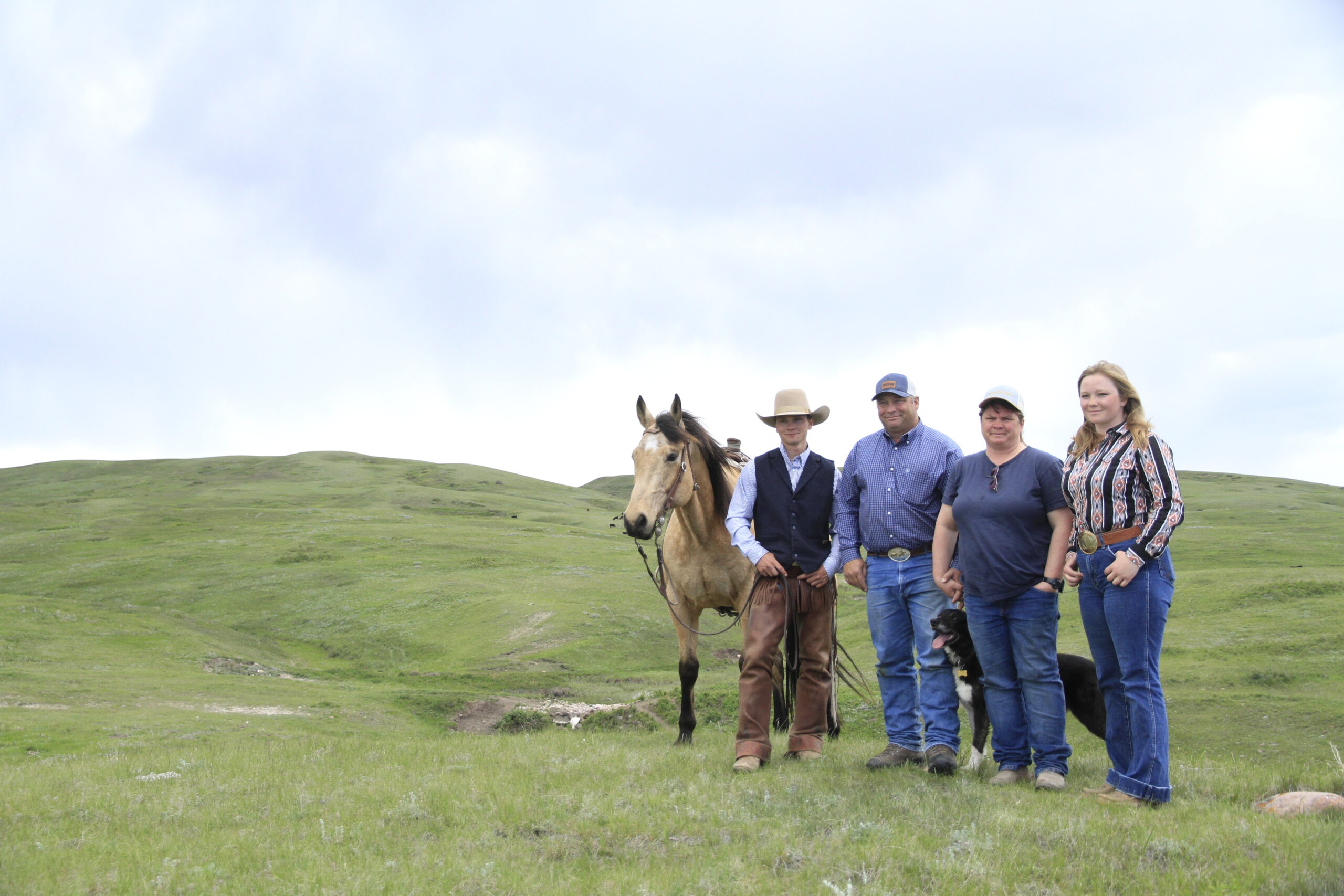
Taylor Ranches with headquarters on the Milk River Ridge, southwest of Warner is a family run cow-calf operation. Robert and Audrey are joined in the daily management and operation of the 800 head commercial Black Angus herd by the two youngest of their four children, Clayton and Courtney.
Along with about 3,500 acres of deeded land, they also manage about 12,000 of crown grazing lease land, made up of mostly rugged native grass prairie. A priority for Taylor Ranches is water management. Decisions around water developments consider water security, quality, availability, and disbursement. The Taylors have fenced off multiple dugouts and installed solar off-site watering systems, which has improved the quality of the water and habitat.
The properties also include critical habitat for species that are listed at risk such as the Ferruginous Hawk, Sprague’s Pipit, and grizzly bear as well species listed as sensitive such as Pronghorn antelope, Sharp-Tailed Grouse and Common Nighthawk.
The Taylors do their best to manage for wildlife in many ways, including:
- Ensuring adequate nesting sites for hawks and eagles by installing man-made nests.
- Prioritizing trees and shrubs to keep the nesting habitat in as healthy condition as possible.
- Haying late in the season, leaving ample time for mother ducks and other ground nesters to successfully nest and get their fledglings to water. (This is absolutely crucial as Taylor Ranches is situated on some of the highest value waterfowl (specifically Pintail ducks) nesting habitat in the country.)
By responsibly and carefully managing their ranch, the Taylors are stewarding critical habitat for Alberta’s species at risk, sensitive species, and popular game animals.
To learn more about Taylor Ranches, click HERE.
Saskatchewan – Block’s Ranching Ltd.
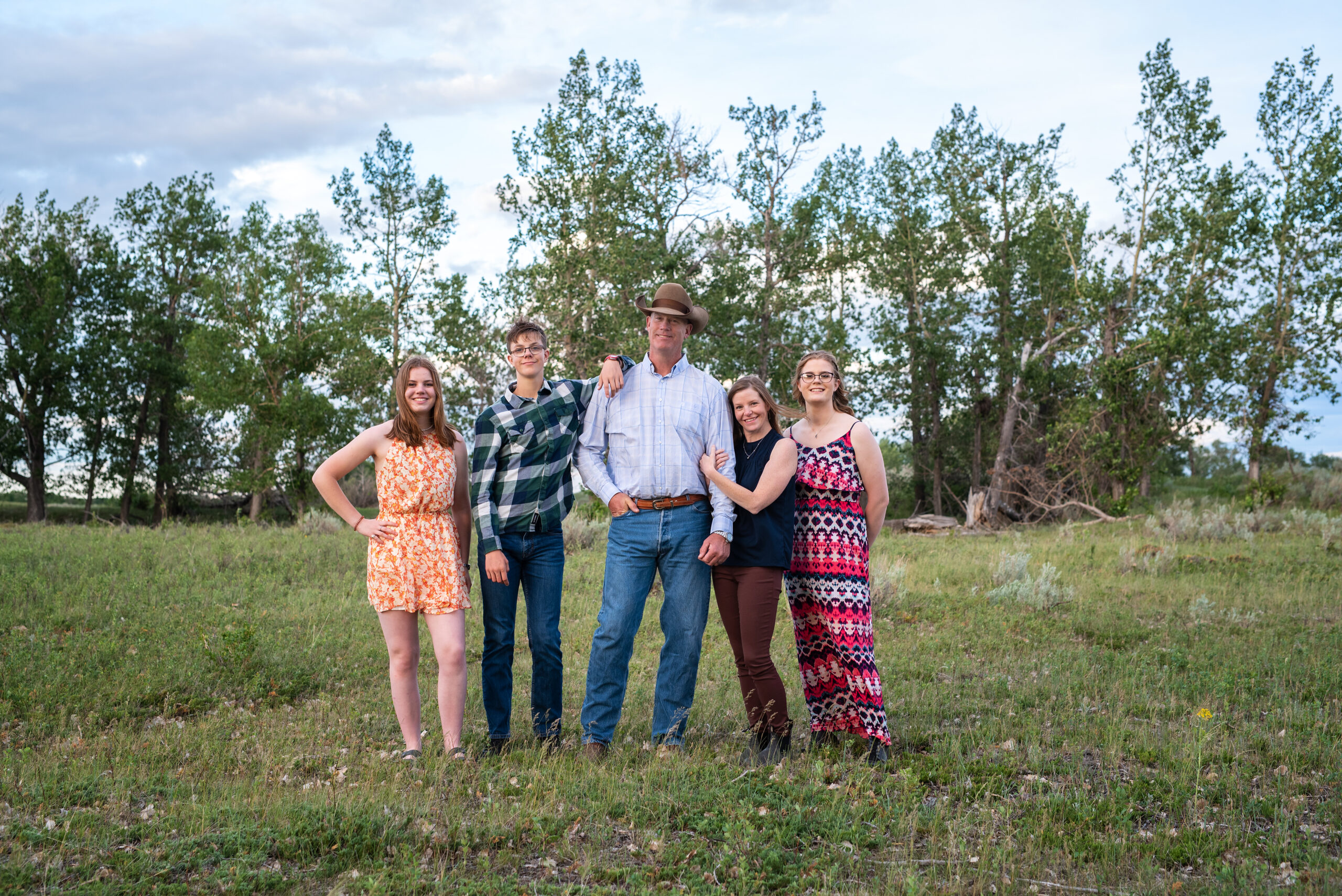
The 2024 Environment Stewardship Award nominee from Saskatchewan goes to Block Ranching – owned and operated by Block family of Neil and Denise, and Arika, Lauren, and Dane. Located near Abbey and Great Sand Hills of Saskatchewan, Block Ranching spans more than 60,000 aces of native grassland and 4,000 acres of tame grassland ecosystems. The Block family, including including Neil’s mother Pat, and long-time hired hand Brian Mastel, operate a combination of cow-calk, feeder, and grasser cattle. They exemplify good stewardship in a delicate ecosystem.
The sand Hills are a sensitive and delicate ecosystem that requires very observant management. The Block family utilizes long rest periods of 12-18 months and stockpiled forages to drought-proof their ranch. In 2023, Birds Canada completed a bird assessment in which they identified 53 different species; seven of which are federally listed as species at risk – the Sprague’s Pipit, Bobolink and the Baird Sparrow. The ranch is also home to species such as Pronghorn, Elk, Mule Deer, Grey Wolve, and the at-risk Ord’s Kangaroo Rat.
To learn more about Block’s Ranching Ltd., click HERE.
Manitoba – The Association of Manitoba Community Pastures
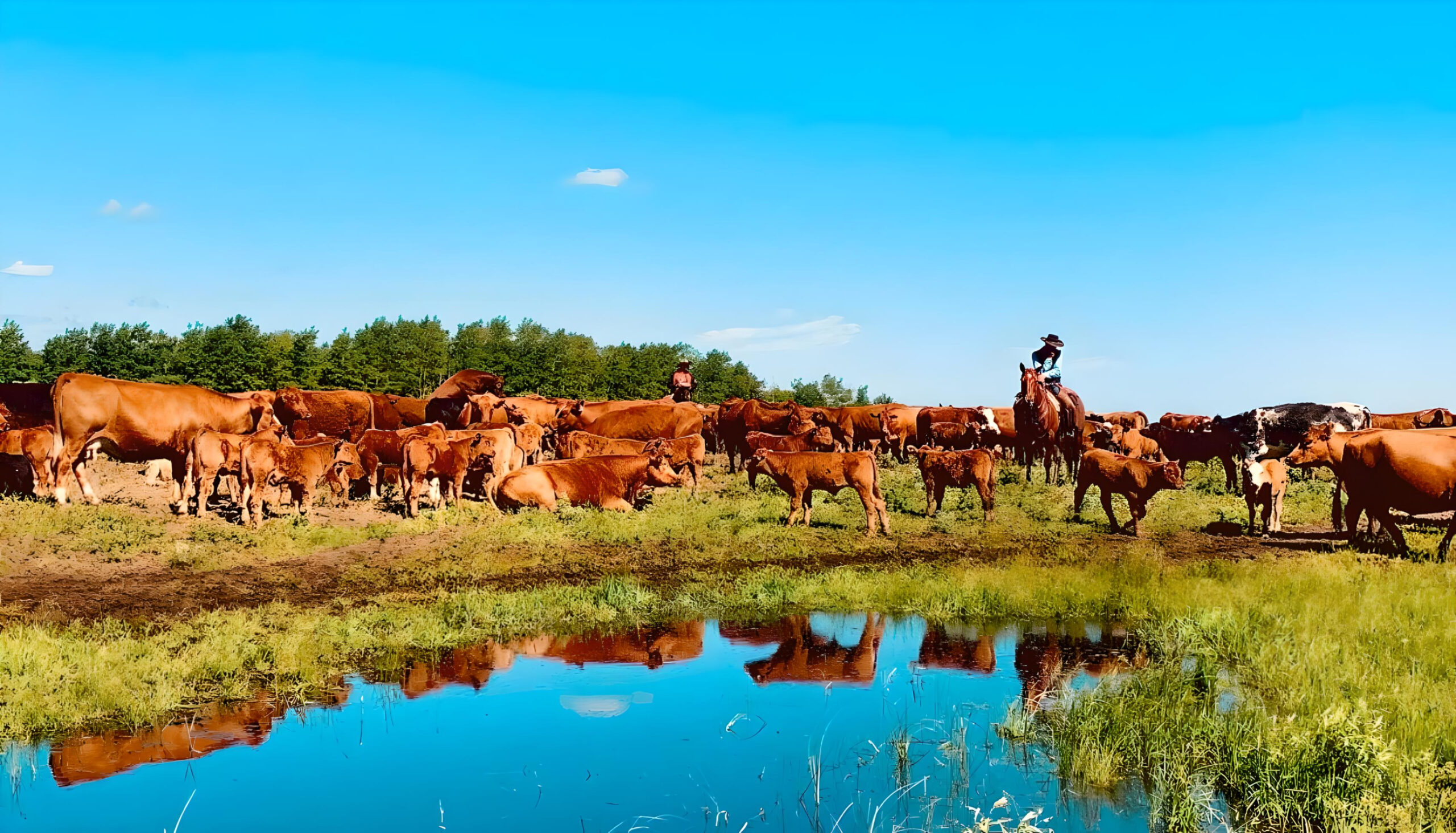
The Association of Manitoba Community Pastures (AMCP) exemplifies outstanding environmental stewardship through its innovative management of 19 community pastures across Manitoba and Saskatchewan. Founded in 2014 after the federal pasture divestiture, AMCP is governed by livestock producers committed to balancing livestock industry needs with ecological sustainability.
AMCP’s core mandate focuses on enhancing the livestock industry while promoting sustainable rangeland stewardship. Covering over 350,000 acres of pristine prairie lands, AMCP’s community pastures are vital habitats supported a diverse array of wildlife, including black bear, moose, and sharp-tailed grouse and numerous Species at Risk birds such as Baird’s Sparrow, Sprague’s Pipit, and Chestnut-collared Longspur.
AMCP remains committed to sustainable practices, aiming to increase stocking rates responsibly, expand infrastructure investments, and continue fostering partnerships that enhance ecological resilience. Through its dedication to environmental stewardship and community engagement, AMCP sets a precedent for sustainable agriculture and wildlife conservation, making a profound impact on Manitoba’s prairie ecosystems and beyond.
To learn more about The Association of Manitoba Community Pastures, click HERE.
Ontario – Circle H Farms
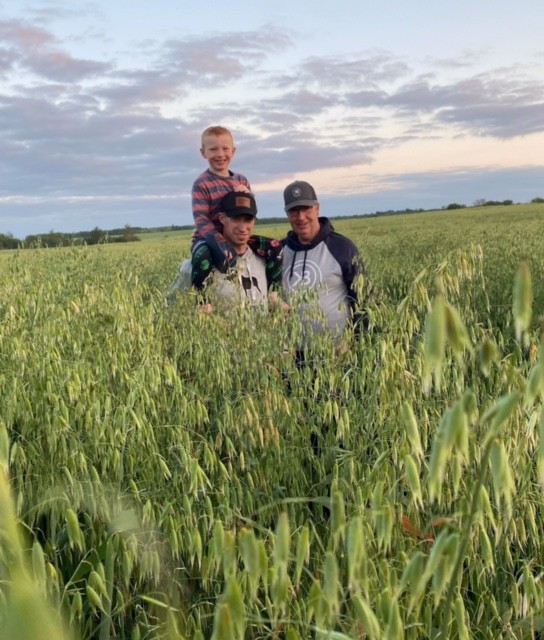
Circle H Farms – the Hyatt family – is the recipient of the Environmental Stewardship Award from Beef Farmers of Ontario. Shawn and Tracy Hyatt, along with Shawn’s brother and sister-in-law, Gord and Pat, own and operate the cow-calk and backgrounding operation near Rainy River. As the second generation on the farm, the Hyatt’s prioritize sustainability. Circle H Farms spans across 3500 acres of hay land and native grassland pasture, along with some bush and wetlands. They run a 275 head cow-calf herd, along with 50 bred heifers and 130 calves retained for backgrounding.
The Hyatt’s sustainably manage their land by revitalizing pastures and enhancing nutrient levels through rotational grazing, winter bale grazing, and solar-powered off-site waterers.
To learn more about Circle H Farms, click HERE.
Quebec – Ecoboeuf
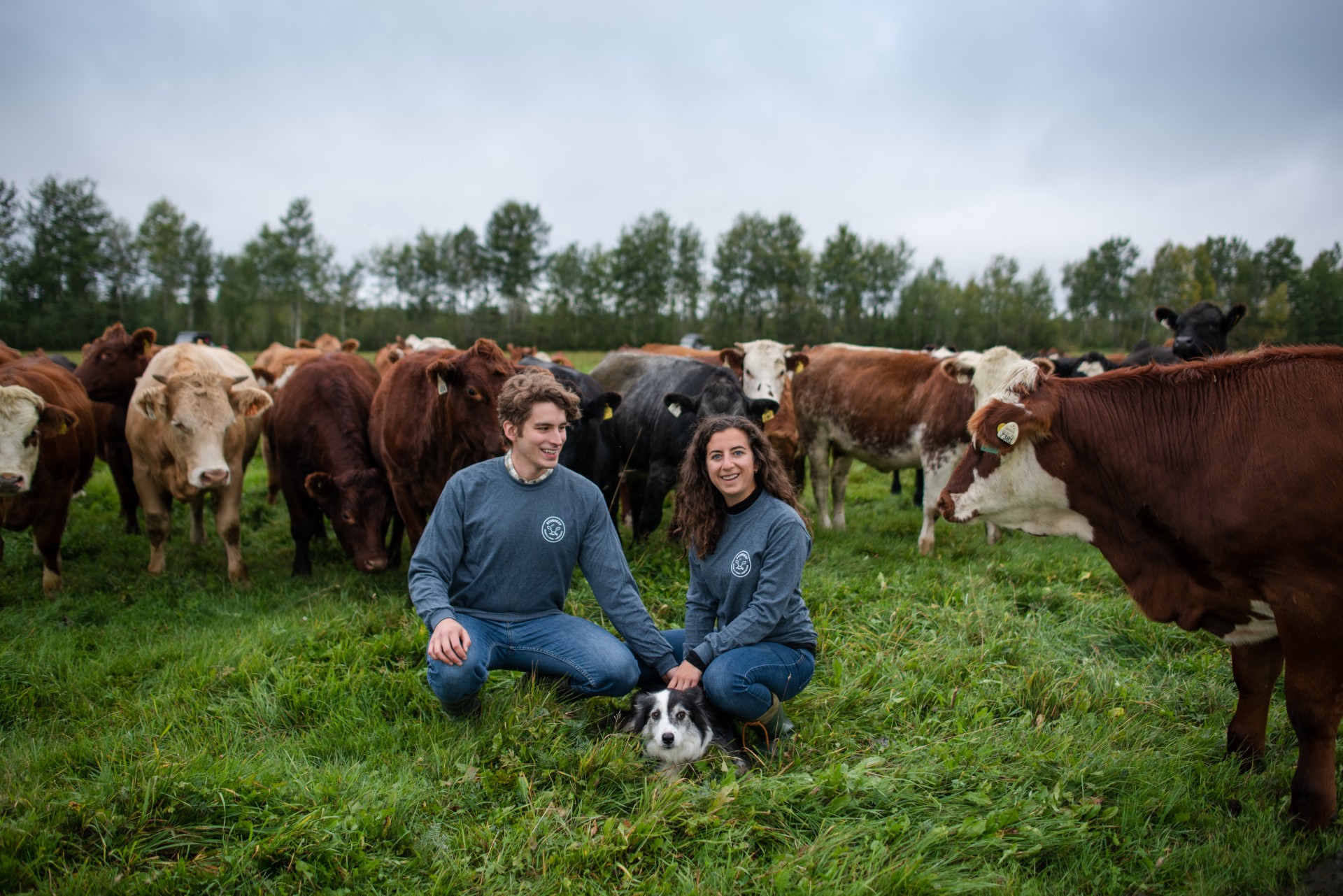
Ecoboeuf, established in 2019 by Frédérique Lavallée and Simon Lafontaine, operates as a dynamic hub for sustainable beef production in western Quebec. Situated within Lafontaine-Noël farm in Dupuy, Abitibi-Ouest, Ecoboeuf functions as a type of living laboratory, dedicated to advancing biodiversity, enhancing soil health, and reducing carbon emissions.
Annually finishing 50 to 60 steers, Ecoboeuf employs innovative practices such as intensive rotational grazing and diverse tree planting to optimize land use efficiency and environmental stewardship.
Ecoboeuf’s commitment to sustainability extends to research in biomethanization. They are looking to build a small scale anerobic biodigester to collect greenhouse gases such as nitrous oxide, methane, and carbon dioxide released by manure and hopefully channel those gases into energy production, contributing to their goal of carbon neutrality. Recognized with the 2024 Quebec Cattle Producers’ Environmental Stewardship Award (TESA), Ecoboeuf exemplifies leadership in sustainable agriculture. Their ongoing research and community outreach aim to share knowledge and best practices, promoting a future where sustainable farming supports ecological resilience and economic viability.
To learn more about Ecoboeuf, click HERE.
Maritimes – Holdanca Farms
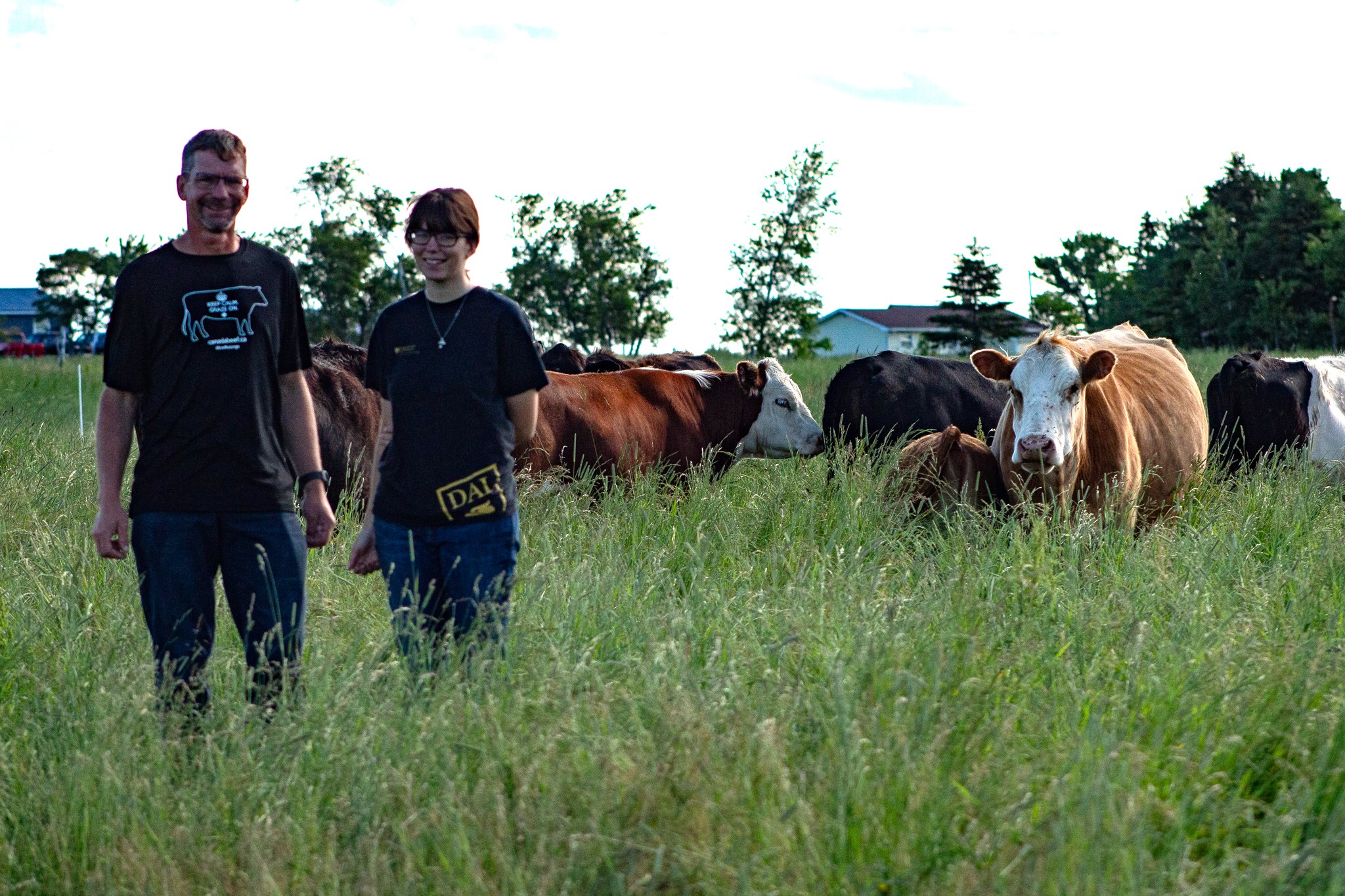
The Maritime Beef Council recognized Holdanca Farms, owned and operated by father-daughter duo, John and Maria Duynisveld, as the Atlantic Canada nominee for The Environmental Stewardship Award. Holdanca Farms is located in Wallace Bay, on Nova Scotia’s North Shore. With the farm nestled into an ecologically significant environment, John and Maria focus on ensuring that their management practices are economically sustainable while also enhancing the environment, home too many wildlife species.
Holdanca Farms has a diverse mix of livestock. They raise about 70 head of grass-fed beef cattle, 100 ewes plus 150-200 lambs for grass finishing, 200 pastured pigs, pastured poultry, and can custom graze up to 150 head of beef cattle, depending on the year. They manage the land to benefit both livestock production and environmental sustainability – of their 500 acres, 250 acres is a managed, biodiverse native woodlot, and the other 250 acres is in long-term (30 plus years) pasture production.
To learn more about Holdanca Farms, click HERE.